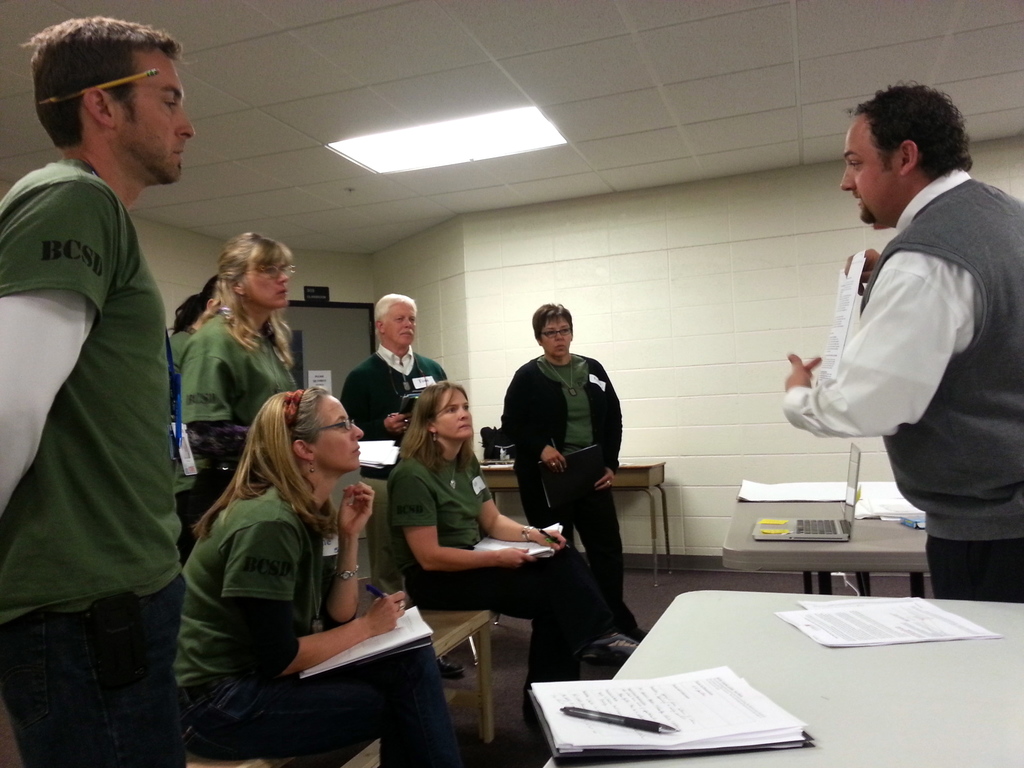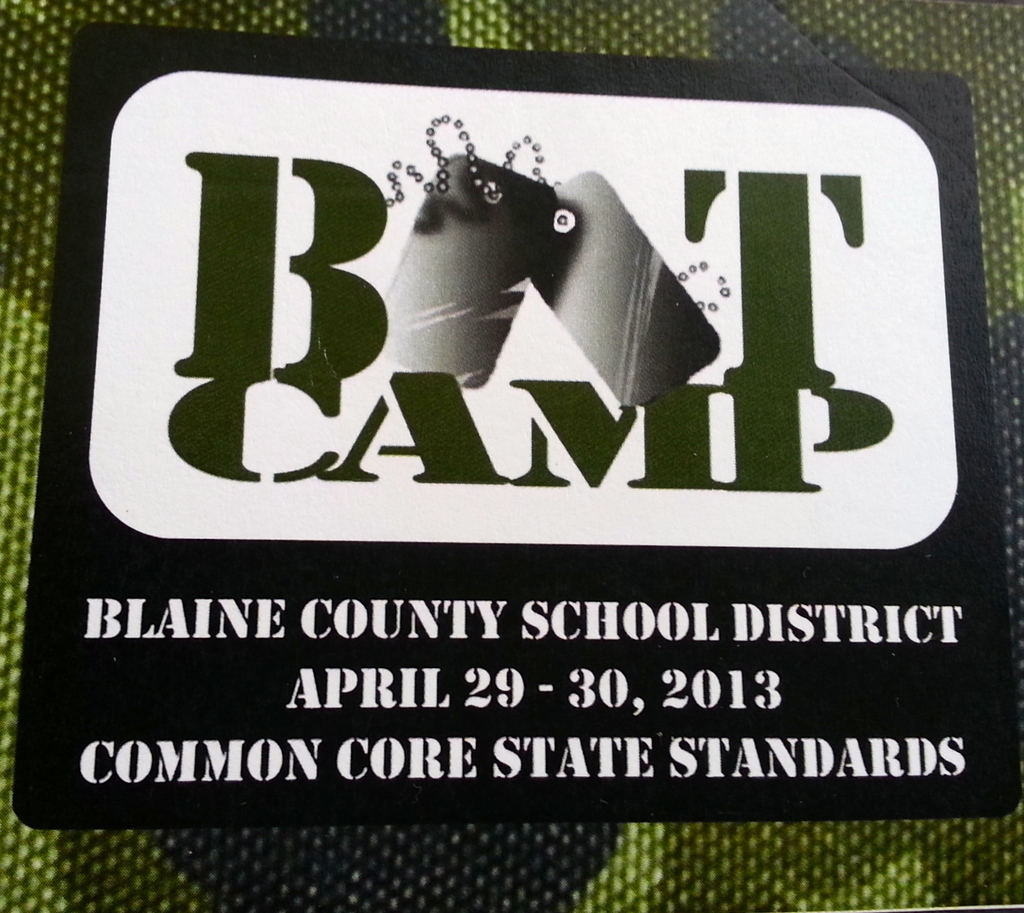Thirty-nine Idaho educators slipped dog tags over their heads and donned green Army-style T-shirts during a new “boot camp” dedicated to implementing Common Core State Standards.
On Monday and Tuesday, teachers, principals and staffers from the Blaine County, Gooding and McCall-Donnelly school districts participated in the Idaho Leads Project’s Common Core professional development workshop in Hailey.

During the 14-hour training session, small groups of educators reviewed the new English language arts and math standards, contrasted them with existing standards, demonstrated lesson planning strategies and modeled teaching styles and techniques.
Next school year, Idaho schools will be required to teach the new standards for the first time. During the following school year, students will first take the Smarter Balanced Assessment Consortium tests that will measure student achievement under the new standards.
Like a military boot camp, Idaho Leads professional development team from Boise State University stressed individual accountability, leadership building and teamwork among participants.
“We wanted it to be rigorous, like a military boot camp,” said Patricia McRae, the professional development coordinator for Idaho Leads. “We tried to make this fun, while everything we did modeled effective instruction practices.”
While McRae and the Leads Project “drill sergeants” used whistles to call the troops to order and assigned mental exercises, they stopped short of barking at teachers to “drop and give me 20.”
Now that the boot camp is finished, the participants – newly christened teacher leaders – are expected to return to their buildings to share what they learned and their new strategies with colleagues.
Donna McKelvey, a seventh grade language arts teacher at Wood River Middle School, said she participated in the boot camp because the new standards will affect her classroom. McKelvey said she hadn’t had too much of an opportunity to study implementation strategies, which is why she signed on for the boot camp.
“The strategies they taught us really applied to strategies a teacher wants to use in the classroom,” McKelvey said. “It wasn’t just stand up and tell us. They gave us opportunities to share ideas and use different resources to help us understand the information and model Common Core strategies for instruction.”
 One model involved a fifth grade lesson teaching “Old Yeller.” Under the old standards, students would read the story, identify vocabulary words and summarize the plot. Once they finished, students would write an essay on what life was like in the pioneer days.
One model involved a fifth grade lesson teaching “Old Yeller.” Under the old standards, students would read the story, identify vocabulary words and summarize the plot. Once they finished, students would write an essay on what life was like in the pioneer days.
The new standards emphasize complex texts, analyzing multiple points of view and sources, re-reading, and applying the lessons to real-world issues. Using those standards, a new lesson on “Old Yeller” would be expanded to include a history lesson on Westward expansion. Then teachers would introduce another nonfiction text – such as a National Geographic Kids article – that analyzes fibs, lies and yarns from a scientific standpoint.
Once they finished, students would write a longer essay – incorporating the history lesson, National Geographic Kids article and “Old Yeller” as evidence – dissecting why some of the story’s characters lied and what repercussions of lying in everyday life can be.
This wasn’t a do-we-don’t-we forum on the standards – that bipartisan decision was made in the Idaho Legislature more than two years ago. On Jan. 24, 2011, the Senate Education Committee voted unanimously to adopt Common Core.
The State Board of Education also voted to implement the standards.
As the state and educators are moving ahead with Common Core, opposition has emerged from residents, some politicians and policy groups that complain there is too much government involvement in the standards.
Since the standards will be implemented statewide during the 2013-2014 school year, the boot camp focused on preparing educators.
Heather Williams, superintendent of the Gooding School District, said the boot camp was an effective way to train educators. She said the interactive activities and team-building exercises were more effective than a traditional “sit-and-get” lecture.
“It was enlightening to be an outside observer on work that parallels what’s happening in your own district,” Williams said. “I’m sitting with teachers and building principals from Blaine County who can be really honest with me because I don’t have any positional authority over their lives whatsoever. I can really learn how the process is working and what the needs are of classroom teachers.”
Based on her experience, Williams said she would recommend other school districts work with Idaho Leads on Common Core professional development or request a local boot camp in their area.
“I think that’s why Idaho Leads is effective – they look at hands-on (training) and getting people engaged,” Williams said. “(District officials) should contact them as soon as they can. This is a group of Idaho educators who are committed to Idaho students and teachers.”
Lisa Kinnaman, a co-director of the Idaho Leads Project, said Leads officials will meet with school district officials and teachers in the coming weeks to plan possible training sessions.
Informational meetings are set for:
- May 30, Coeur d’Alene.
- June 10, Boise.
- June 24, Idaho Falls.
- June 25 Twin Falls.
Over the next year, Idaho Leads officials will work with districts on integrating Common Core by utilizing the project’s goals of building relationships, managing change, utilizing effective practices and systemic, continuous improvement.
Disclosure: The Idaho Leads Project heads up Idaho Ed News. Both Idaho Leads and Idaho Ed News are funded through grants from the J.A. and Kathryn Albertson Foundation. Like Idaho Leads, Idaho Ed News reporters are Boise State University employees.
